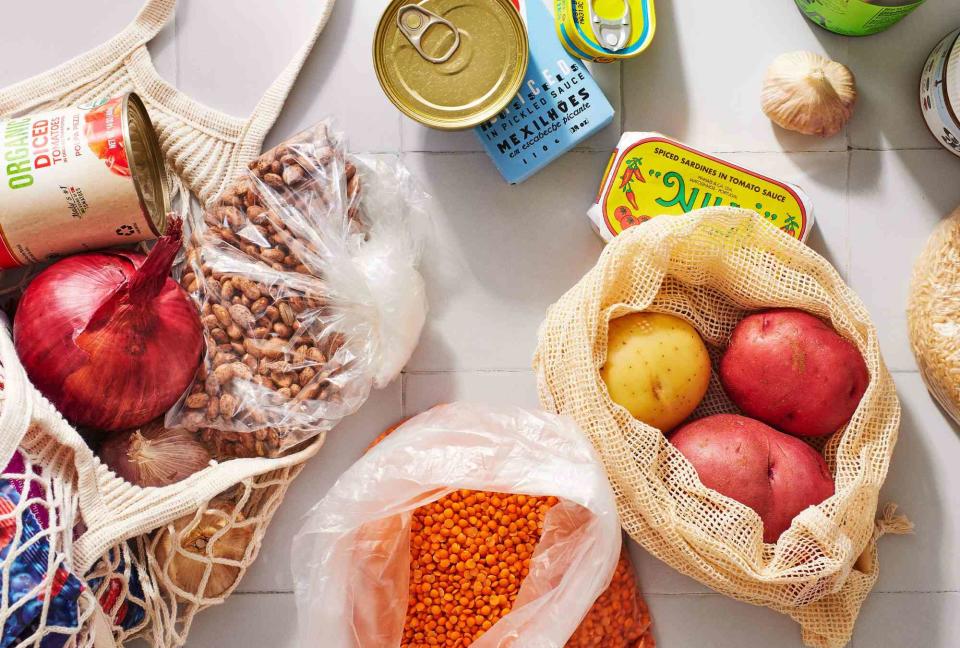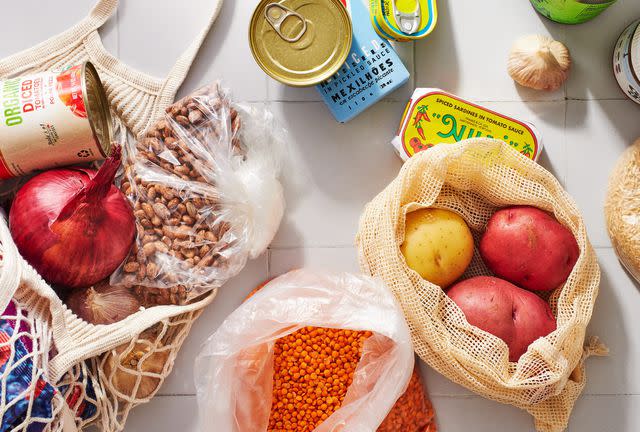The 12 Best Mediterranean Diet Foods on a Budget, According to a Dietitian
Here's the proof that eating nutritiously doesn’t mean you need to break the bank.

Reviewed by Dietitian Maria Laura Haddad-Garcia
When it comes to eating healthy, flexibility is key to making new habits stick long-term. Part of the reason the Mediterranean diet is so highly regarded is because it's flexible and easy to follow, unlike fad diets that often have rigid rules. The Mediterranean diet simply encourages you to eat more fruits, vegetables, whole grains, unsaturated fats and lean proteins (including plant-based protein sources). You get to choose exactly what foods to eat within those groups.
What's more, you don't need to break the bank to follow this eating pattern. There are ample nutritious, budget-friendly foods that can help you gain the healthy benefits of the Mediterranean diet in a way that works for your lifestyle. Add these 12 foods to your shopping cart to get a nutrient boost at a lower price point.

1. Beans
Beans are a great source of fiber, vitamins and minerals like potassium, magnesium and iron—nutrients that many Americans aren't getting enough of, per the Department of Health and Human Resources. Plus, beans are rich in protein and fiber, making them a super-satisfying plant-based addition to any meal. Choosing beans in place of meat once or twice a week will help you cut back on saturated fat, a nutrient to limit on the Mediterranean diet. According to the Department of Agriculture, there are over 4,000 varieties of beans cultivated in the U.S. And their varying flavor profiles make them a versatile ingredient to use from breakfast to dinner. Black-eyed peas are delicious in our Chipotle Black-Eyed Peas & Collards with Crispy Shallots. Cannellini beans shine in a Creamy White Bean Soup. And pinto beans are an affordable addition in recipes like this Slow-Cooker Chicken & Pinto Bean Enchilada Casserole. Surprisingly, some types of beans can even be added to desserts to bump up the fiber and protein and contribute a creamy texture, like in our Peanut Butter & Chickpea Blondies. Canned beans are a cost-effective option, but if you have the time, dried beans are even less expensive and last for years in your pantry.
2. Peanut Butter
Nuts pack an impressive punch of protein, fiber and healthy fat, a combination that helps satisfy your hunger and keeps you full for longer after a meal. The specific type of fat they contain—unsaturated fats—is favored in the Mediterranean diet and has been shown to help support heart health, lower inflammation and improve brain health.
A 16-ounce jar of peanut butter usually costs around $3 at the grocery store, making it a great addition to your diet if you're on a budget. To help make it more cost-effective, skip organic or brand-name products and keep an eye out for sales when you shop. Though it's popularly used on toast or paired with fruit, peanut butter is a delicious addition to savory dishes like our Spicy Peanut Noodles with Edamame, Bell Pepper & Kohlrabi, Creamy Peanut Soup with Sage or Roasted Tofu & Broccoli with Peanut-Curry Sauce.
3. Lentils
There are many reasons to love lentils. For starters, they're super nutritious, with a 1/3-cup serving of cooked lentils boasting 6 grams of protein, 5 grams of fiber, and 13% and 30% of your daily needs for iron and folate, respectively, per the USDA. Another positive feature of this plant-based protein source is its price point, with most varieties clocking in at less than 10 cents per serving. Lastly, lentils cook much more quickly than other types of dried legumes (think: 15 to 20 minutes compared to over an hour for dried beans or chickpeas). Plus, they're super versatile and go great in everything from our Lemony Lentil Salad with Feta to our Shorbet Ads (Egyptian Lentil Soup) and Lentil Stew with Salsa Verde. They're even great in smoothies, like our five-star Mango-Ginger Smoothie recipe.
4. Potatoes
What's not to love about the humble spud? The Mediterranean diet emphasizes eating more vegetables, and while not the most colorful of veg, potatoes are a very nutritious and budget-friendly option. Potatoes are a great source of fiber (especially if you eat the skin), as well as potassium and vitamin C, two nutrients that support healthy immune function and heart health. Plus, they're a surprising source of protein, with a medium baked potato delivering 4 grams, per the USDA. Coming in at around $1.50 per pound, potatoes are tasty in dishes like our Southern Green Beans & Potatoes, German Potato Pancakes and Potato Frittata.
5. Canned Fish
The Mediterranean diet encourages eating two servings of fish weekly due to the omega-3 fatty acids they contain. Opting for canned fish is a great way to up your intake. This shelf-stable alternative is much less expensive than its fresh or frozen counterparts—for example, a 5-ounce can of salmon costs about $2 compared to at least $4 for the same amount of fresh salmon. Plus, canned fish like sardines, salmon, tuna and mackerel are all precooked and ready to enjoy, making them a quick and easy protein addition to your meals. Try them in our Skillet Tuna Noodle Casserole, our Sesame Tuna Salad or transform them into tasty Easy Spicy Salmon Cakes for a 20-minute main.
6. Canned Tomatoes
Canned tomatoes are picked at the peak of freshness, so their flavor and nutrients are preserved when canned. In fact, canned tomatoes even deliver greater levels of iron and the antioxidant lycopene than fresh tomatoes do. Plus, they cost a fraction of the price of fresh, especially if you buy them in bulk at a wholesale store like Costco. Add canned tomatoes to everything from curries to pastas and stews, such as our Shakshuka or Slow-Cooker Arroz con Pollo (Chicken & Rice), for flavorful and nutritious meals.
7. Onions & Garlic
Onions and garlic are regularly used in many cuisines across the globe, including those in the Mediterranean region. These staple cooking aromatics are actually great sources of nutrition, with both onions and garlic being sources of prebiotic fiber, a type of fiber that acts as food for the healthy bacteria in our gut microbiome. Research has found that garlic provides other health benefits, like helping support healthy blood pressure, cholesterol and immune health. Onions help support healthy blood sugar levels and have anti-inflammatory properties that can benefit your heart health.
Not to mention, onions and heads of garlic can be stored in your pantry so they don't take up fridge space, they last a long time and they're a cost-effective way to up your vegetable and fiber intake. Include onions and garlic in your diet by trying dishes like our Stuffed Cabbage Soup and Scallion-Ginger Beef & Broccoli.
8. Rice
The Mediterranean diet encourages increasing your intake of whole grains to enjoy the health benefits they provide, like supporting heart health, healthy digestion and stable blood sugar levels. Nutritious whole grains include corn, barley, quinoa, oats, bulgur and teff, to name a few. But sometimes specialty grains can come at a higher price or may be less available where you shop. Luckily, rice is a great budget-friendly grain that is widely available. While any type of rice—including white rice—can have a place in a healthy eating pattern, brown rice is higher in fiber and protein than other types. This versatile grain makes a great side on its own and can be added to a variety of dishes for a satisfying main, like our Easy Fried Rice and Crispy Fish Taco Bowls.
9. Frozen Berries
Another key component of the Mediterranean diet is varying your fruits and veggies as much as possible. The more color you add to your plate, the greater variety of nutrients you receive. Berries are delicious, colorful and packed with nutrients—they're a great source of fiber, vitamins, minerals and anti-inflammatory compounds. In fact, enjoying them regularly can be a major boon for your brain health. But fresh berries can go bad if not eaten soon after purchase. That's where frozen berries come in.
Frozen berries are usually flash-frozen at peak ripeness to preserve their flavor and nutrition while allowing them to last for months in the freezer (as compared to days in the fridge). Plus, they typically cost less than half what their fresh counterparts cost. Add them to yogurt parfaits, oats and smoothies, or top yogurt or cottage cheese for a tasty and healthy snack. And if you're looking for something on the go, make a batch of these Breakfast Lemon-Blueberry Oatmeal Cakes, which you can freeze for up to three months.
10. Oats
Oats are another example of a fiber-rich whole grain that can be more accessible to those on a budget. Plus, dried oats have a great shelf life, lasting up to two years if stored properly. A 30-ounce container of name-brand Quaker Oats retails at $5.50—that's less than 19 cents per ounce. And store-brand options can cost even less. Besides your standard oatmeal or overnight oats, try making energy balls with ingredients like oats, nut butter and dried fruit for a snack that's as convenient, energizing and as customizable as you'd like.
11. Frozen Greens
Leafy greens are one of the most nutrient-dense foods around, meaning they pack many vitamins, minerals and nutrients into a small serving. Since fresh greens are quite perishable, opting for frozen greens like kale and spinach can help you easily add a serving of vegetables to anything you make without the fear of food waste. While they may not be great for fresh recipes like salads, frozen greens are basically interchangeable with fresh in most recipes where the greens are cooked or stewed, like in our Spinach, Feta & Rice Casserole or Hearty Chickpea & Spinach Stew. (Just note that you may have to adjust the amount used: as a general rule, 10 ounces of frozen spinach equates to about 1 pound of fresh.)
12. Corn
Believe it or not, corn is a whole grain and one of the top grain sources in many cuisines across the globe, such as in Latin American cuisine. And it's one of the more budget-friendly whole grains, costing less than $1 per ear or $2 per frozen 16-ounce bag. Corn is packed with fiber, vitamins and antioxidants that can help with everything from your gut health to your vision. If you enjoy it, it's definitely worth a spot on your plate (whether it's on the cob, as a side or in the form of a tortilla). And especially when it's in season in the summer, it can be a budget-friendly vegetable to buy fresh and freeze to use later. If you're looking for other ways to enjoy corn, try our Hot Honey Corn Salad for a sweet and savory dish.
The Bottom Line
The Mediterranean diet principles can be adapted to fit any type of cuisine or dietary preferences. Various foods, including budget-friendly options like this list, can fit into the eating pattern. Now that your kitchen is well-stocked with nutritious foods, try out these beginner-friendly, Mediterranean diet-approved recipes for inspiration to help you get started.
